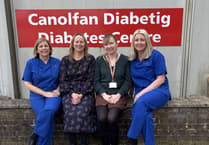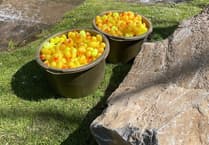Other names for beach debris
The amount of rubbish washed up on the beaches across West Wales appears to be increasing daily to the detriment of visitors to the area and locals who frequently take walks amongst the sandy coves.
The stuff I’m referring to is often called ‘flotsam and jetsam,’ but do you know the meaning of the words?
While the phrase ‘flotsam and jetsam’ is often used to describe ‘odds and ends,’each word has a specific meaning under maritime law.
Flotsam and jetsam are terms that describe two types of marine debris associated with vessels. Flotsam is defined as debris in the water that was not deliberately thrown overboard, often as a result from a shipwreck or accident. Jetsam describes debris that was deliberately thrown overboard by a crew of a ship in distress, most often to lighten the ship’s load.
Under maritime law, the distinction is important. Flotsam may be claimed by the original owner, whereas jetsam may be claimed as property of whoever discovers it. If the jetsam is valuable, the discoverer may collect proceeds received though the sale of the salvaged objects.
The mission of a Marine Debris programme is to investigate and remove problems that stem from marine debris to protect and conserve our nation’s marine environment, natural resources, industries, economy, and people. Marine debris is defined as any persistent solid material that is manufactured or processed and directly or indirectly, intentionally or unintentionally, disposed of or abandoned into the marine environment.
A majority of the trash and debris that covers our beaches and floats in our ocean comes from storm drains and sewers, as well as from shoreline and recreational activities such as picnicking and beachgoing. Abandoned or discarded fishing gear is also a major problem because this trash can entangle, injure, maim, and drown marine wildlife and damage property.
Golden arches
McDonald’s has a good track record on the sourcing of British beef, pork and eggs but when it comes to poultry meat there has always been substantial room for improvement. Whilst the free range eggs which are used to serve the 3.7 million customers in the UK that visit McDonalds restaurants daily are all sourced from the UK, the sourcing policy for poultry meat has not been as commendable.
Chicken used across the UK’s 1,280 McDonald’s restaurants is currently sourced from Europe, Brazil and Thailand, as well as the UK.
Raising the question last year, a young poultry producer from the West Midlands, James Mottershead asked McDonald’s Supply Chain Director for the UK and Ireland, Connor McVeigh why McDonald’s had not shown similar investment into the sourcing of British poultry meat that they had already made in other fields?
At an Egg and Poultry Industry conference held last month, James asked again what could be done to work towards an improved ratio of British sourced chicken over the next five to 10 years.
McVeigh announced plans of the UK’s largest restaurant chain to do just that- increase their sourcing of British chicken. He confirmed that chicken is now the most popular item on the McDonald’s menu and globally the restaurant chain had made eight commitments to chicken sourcing, stating that most of them were already in place in the UK.
However, even more encouraging news was yet to come as he ended his presentation announcing that by 2020 McDonald’s in the UK and Ireland will have tripled the amount of British chicken that they source, meaning that there will be ten times more British chicken on their menu compared to 2014.
For the NFU, Aimee Mahony, poultry adviser, commented: “We welcome this announcement by McDonald’s as we have been asking them for a better commitment to the sourcing of British poultry for a number of years. Whilst it is good news that McDonald’s are going to triple the amount of British chicken used in their restaurants in the UK and Ireland it’s important to note that Mr. McVeigh did not confirm what percentage of their overall sourcing this would be. We will continue to liaise with McDonald’s and ask them to further improve their sourcing of British poultry meat.”
Who knows me better than me!
Some years ago, when I was writing regular reports on YFC activities we had, in the county on an exchange visit a charming young member of the Future Farmers of America and I approached her for some information about herself.
It turned out that she also wrote about young farmers and she suggested that she write up a little bit about herself to ‘save me the trouble!’ when thinking about having a new biography written.
She wrote: “The question of who to write it always stumps me. Answering someone’s shallow questions about who you are has always seemed a strange way to approach the task of telling others about yourself and your life’s mission.
“In order to alleviate that emotion of seeming vanity, I will take on the job myself. Who knows me better than me?
“I was raised by people who found life hard and wonderful at the same time. A farm in central Kentucky is what I call my homeland. The tender shoots that sprang from my grandfather’s carefully ploughed furrows were lessons about life. Planting, reaping, seed time and harvest. These are the bases of all of our existence, really. We planted each spring to make sure we survived the winter’s dark days and, spiritually, we are nothing if we are not farmers planting seeds for the master’s great wedding day harvest.
“We celebrated the rain after weeks of drought, always decidedly giving glory to God for His provision.
“We fed and housed ordinary old Angus and Hereford cows like they were better than we were. We sweated through the heat of the tobacco season and we prayed before every meal. We were fed on the baby food of ‘every good gift comes from the Father’ and, as we matured, we graduated to the meat of ‘though He slay me, yet, I will praise Him.’
“Surprisingly, no one has ever asked me how I came to follow Jesus. Of course, my parents and grandparents held my feet to each precept of Christianity, but just because that is so does not mean salvation for me.
“Actually, I was wooed!
“For years, I sat and listened to the congregational songs and their gospel plucked strings in my heart. It was not until I went to youth camp that it became clear that I had to take part in my Saviour’s death by repentance.
“After camp, I did just that. There was not a parade. There were no fireworks. There were no flaming tongues falling at the front pew where I knelt. It was just I and my Sunday school teacher kneeling there.
“She prayed the words first and I repeated them, and I have repeated them in some fashion every day since. ‘Lord, Forgive me for I am a sinner.’ After words that heavy, God does the great and awesome remaking of a human heart. Nothing is the same then. Thank God for that.
“Music was always a part of me, though I did not come from a musically literate family. Each week, my mother cleaned the small Baptist church, where we attended, my job was to vacuum the never-ending sea of sanctuary carpet.
“Mom allowed me to take a turntable from our home and listen to records as I swept. I only had two LPs - one I got from a mail order add of Keith Green - the record was sent on a ‘just send what you can’ basis from Keith’s ministry.
‘So You Wanna Go Back to Egypt?’ was the title.
“Keith impacted my life by allowing me to pay for the recording with what I had, which was two dollars, fifty.
“Another LP landed in my little pile of two from God only knows where. It was The Gaither Trio recording called ‘We Are Persuaded’ - I listened to that music for hours and looked at Gloria’s smile. I remember being envious of their happy faces and locked arms as they skipped down the sidewalk together.
And that music, I understood it then - but understand it more deeply now. ‘Because He Lives’ was on that recording. I swept, dusted, picked up discarded bulletins and sang, ‘I know who holds the future and life is worth the living just because He lives.’
“Planting and reaping. Jesus planted in me. He is reaping what He has sown still today.
“Like Jesus, I am also a planter now. I plant the strange supernatural seeds of faith, love, mercy; forgiveness, trust, joy.... and I do it for the child who vacuums the auditoriums of life.”
You would think
You would think that when a major bank closes its premises they would, even out of common courtesy, advise customers of their intentions and of where counter facilities are still available.
Customers of HSBC in Pembrokeshire, some having been loyal for more than 50 years, have not enjoyed this small act of consideration.
Men at fault?
“It is shameful that there are so few women in science... There is a misconception in that women scientists are all dowdy spinsters. This is the fault of men”- so said Chien Shiung-Wu, Chinese-American experimental physicist who made significant contributions in the field of nuclear physics, and worked on the Manhattan Project.





Comments
This article has no comments yet. Be the first to leave a comment.